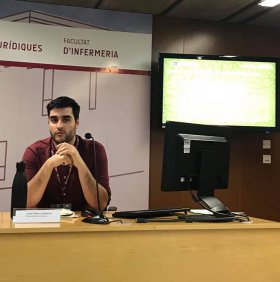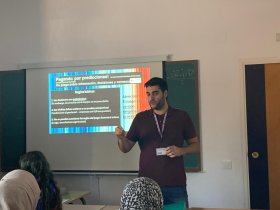Gastón Médici Colombo


PhD Programme: Law
Research group: CEDAT – Centre d’Estudis de Dret Ambiental de Tarragona
Supervisors: Jordi Jaria Manzano & Susana Borràs Pentinat
Bio
Gastón Médici Colombo obtained a Bachelor degree in 2013 at the Universidad Nacional de Rosario (Argentina). Subsequently, he worked as an associate in his own law firm for four years. In 2014, he started a Master degree in Environmental Law at the URV, and obtained the degree in 2016. His Master thesis “La tutela judicial frente al daño ambiental colectivo en Argentina y España. Radiografía del Acceso a la Justicia Ambiental was awarded the Best Master Thesis. In 2017 he became a research fellow at the Tarragona Centre for Environmental Law Studies (CEDAT) and PhD candidate at the URV. During this last period, he has published several papers on environmental democracy and human rights, including a chapter in the book Rethinking Sustainable Development in Terms of Justice. Issues of Theory, Law and Governance (Cambridge Scholars Publishing, 2018). Moreover, he has attended many conferences, courses and seminars, as participant and speaker. His current research interests include climate change litigation and environmental democracy, particularly, in the Latin-American scope.
Project: Climate crisis, authorization of carbon-intensive projects and their judicial control
Humanity is at a defining moment in the face of the climate crisis. The decade of the twenties finds global society on a trajectory that will sooner rather than later exceed even socially acceptable temperature targets, with a little carbon budget available and without having carried out the required energy transition in a timely manner. However, while the window of opportunity is rapidly narrowing, the most relevant actors do not seem to be acting accordingly. Among other areas, this contradiction has been noted in infrastructure planning and development, especially those related to the extraction, distribution and consumption of fossil fuels. With no other route available, the conflict that such a situation is creating is being channelled through judicial challenges to the legality of the planning and authorisation of such infrastructure. This research analyses this type of initiative to unravel its judicial reception at the transnational level. Specifically, it studies a hundred lawsuits in more than twenty jurisdictions in which the viability of certain projects has been questioned due to their impacts on the climate system. From this analysis, it can be seen that there is still considerable room for courts to ensure a more serious and fair consideration of the impacts on the climate system of infrastructure projects when deciding whether to authorise them. This implies that litigation still has an important and legitimate role to play in this context and, more generally, in the future of global climate governance.
Open Access publications
- Medici-Colombo, Gastón, "El Acuerdo de Escazú: La implementación del Principio 10 de Río en América Latina y el Caribe", Revista Catalana de Dret Ambiental, Vol. 9, No. 1, 2018. View full-text
- Medici-Colombo, Gastón, "Carbon budget and fossil fuel production planning: The 'gloucester resources ltd. v. minister for planning' case", Revista Catalana de Dret Ambiental, Vol. 11, No. 1, 2020. View full-text
- PHD THESIS: Climate crisis, authorization of carbon-intensive projects and their judicial control
International secondments
- University of Strathclyde, UK. 3,5 months (2019).
- Universidad Nacional de Rosario, Argentina. 1 month (2021).
Outreach activities
- European Researchers’ Night: “Crisis climàtiques: una qüestió de drets humans i justícia”.
Prizes & Awards
- Selected legal analyst within the Climate Change Litigation Initiative (C2LI), University of Strathclyde, UK.
- Best doctoral thesis in Environmental Law in the VII edition of the Josep Miquel Prats Canut Award.
News
- Horizon Results Platform: The Escazú Agreement: implementing Environmental Democracy (and climate action) in Latin America



